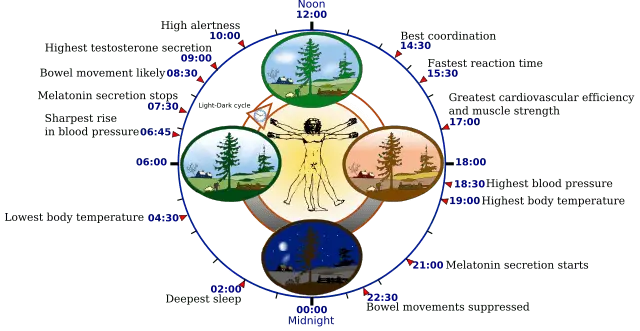Contents
You have trouble falling asleep, your sleep is shallow, you wake up often, and during the day you are sleepy, tired, irritable and without strength. It may be because your melatonin levels are too low.
Melatonin is a substance produced naturally by the body, mainly in the pineal gland. Thanks to it, we feel the need to sleep in the evening, and in the morning we wake up refreshed and ready for action. Low or unregulated levels of melatonin secretion disrupt our circadian rhythms of sleep and wakefulness.
Our internal clock
According to medical standards from 2017, the treatment of disorders of the circadian rhythm of sleep and wakefulness, “the inhabitation of our planet by living organisms, including humans, required adaptation of the course of physiological processes and behavior to the conditions of a 24-hour day, which is a consequence of the Earth’s rotation around its axis.»
The inevitable sequence of day and night forced the emergence of adaptive mechanisms that allow to predict their consequences and properly prepare the body for further behavioral and metabolic challenges. For it is obvious that often contradictory physiological processes, such as movement and rest or sleep and wakefulness, cannot take place simultaneously or always proceed with the same intensity.
This justifies the need for an endogenous mechanism that generates and synchronizes the course of most human physiological processes. This mechanism was called the biological clock, and the processes it dictates are circadian rhythms (and seasonal cycles):
“[…]” The processes and physiological parameters that show circadian rhythm in the human body include, among others, sleep and wakefulness, body temperature, metabolism and energy homeostasis, heart rate, peripheral vascular resistance and blood pressure, blood viscosity and plasma fibrinolytic activity, synthesis and release of pro-inflammatory cytokines and hormones (cortisol, melatonin, prolactin, growth hormone), unbound with food, secretion of gastric juice, flow and expiratory volume of the lungs. Circadian rhythms change throughout life. Newborns have ultrasonic rhythms, i.e. rhythms of sleep and activity over a period of several hours. With aging, two basic parameters of the circadian rhythm change: the amplitude of the rhythms of individual processes decreases and the period of the circadian rhythm shortens ”.
Functioning in accordance with the biological clock affects the condition, longevity, its dysregulation is associated with many health problems, including with poor quality of sleep, which further contributes to the deterioration of health. Sleep is needed for homeostasis, that is, the balance of the whole organism. When we fall asleep, our body temperature drops, slowing down many of the body’s responses. The process of intensive regeneration and cleansing begins. If we sleep poorly, our natural repair processes are disturbed. The effect of this is a decrease in immunity.
The body produces fewer immune cells and more stress hormones that interfere with its natural defenses. Disturbances in circadian rhythms increase the risk of diabetes, high blood pressure, arrhythmias, heart failure, depression and cancer. They also promote obesity. Problems with sleep also worsen concentration of attention, remembering and reaction speed. Lowering the level of melatonin may also result in the lack of effective inactivation of free radicals, as well as the susceptibility to the appearance of neurological diseases.
The hormone that puts us to sleep
Everyone produces melatonin, which regulates his circadian rhythm. Its secretion begins between 55 p.m. and XNUMX p.m., and reaches its highest concentration between XNUMX and XNUMX a.m. Its production is gradually reduced at seven and ends around nine in the morning. Unfortunately, the daily secretion of melatonin decreases proportionally with age. The most of this hormone is produced by four-year-olds up to the age of ten. After that, the secretion of melatonin decreases somewhat, but remains constant until the age of XNUMX. With increasing age, especially from the age of XNUMX, the circadian rhythm of melatonin synthesis becomes gradually flattened, i.e. there is no nocturnal increase in melatonin secretion. Low melatonin levels can cause sleep disturbances, light sleep, or frequent awakenings in the elderly.
Melatonin is not just for sleep
Further indications of Polish standards in the treatment of sleep rhythm disturbances indicate that “melatonin shows a high safety profile, no clinically significant interactions of melatonin with other drugs are observed in practice. High doses of melatonin should be taken before midnight. In the case of insomnia with sleep disorders, immediate-release melatonin can be used in a dose of 5 mg 1 hour before bedtime, and in the case of problems with waking up at night, 5 mg of melatonin should be used just before falling asleep. The recommended treatment period is 6-12 weeks. Melatonin administered in the form of preparations regulates our biological, and therefore natural clock, and this takes time. For the treatment of blind people, melatonin often needs to be given as an ongoing treatment.
Adjusting watches
At the moment, we are failing to manipulate our biological clock too much and adapt it to our needs. The rare exception is that you can modify your sleep hours after changing time zones by taking melatonin. When we travel by changing the time zone, our internal clock diverges completely with sunrise and sunset. We wake up in the middle of the night feeling refreshed and want to eat. Taking melatonin around XNUMX p.m. in the time zone we’re in helps you fall asleep and adjust to the changed time. Also, night workers who suffer from disturbances in the daily rhythm of the day, thanks to melatonin, they can re-synchronize with their own internal clock.










